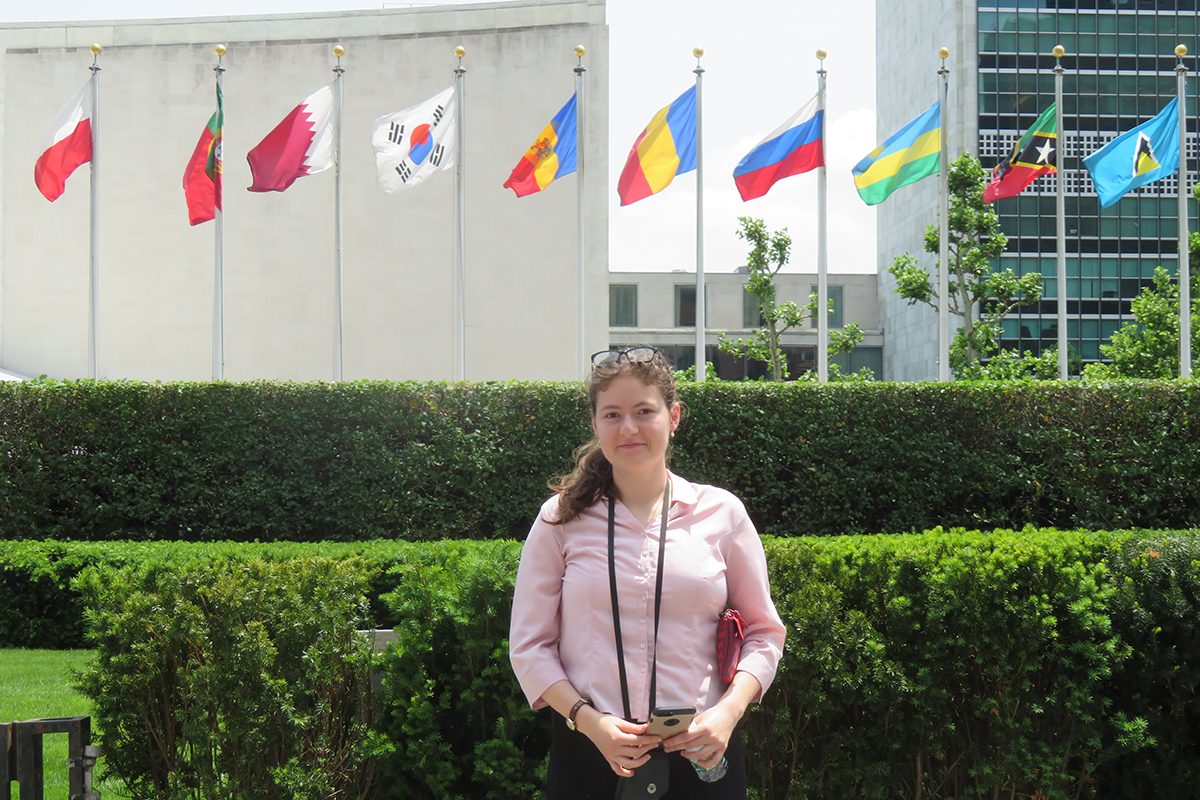
Alumni Insights: My week at the UN
This past June, I had the opportunity to visit the United Nation’s headquarters in New York City as part of the UN Intensive Summer Program I attended at Seton Hall University’s School of Diplomacy and International Relations.
While there, I had the opportunity to meet many UN professionals who have devoted their careers, and indeed their lives, to the UN’s mission of global peace. We spent most of the week at the Church Center building (literally on the other side of the street from UN headquarters) and were very fortunate to meet individuals like Henia Dakkak (Program Advisor at the UN Population Fund), Carl Skau (Alternative Representive to the Security Council and Spokesperson for the Swedish mission to the UN), and Stéphane Dujarric (Spokesman for the Secretary-General).
What impressed me the most about everyone we met who worked either for, or with, the UN was their humble attitude towards their personal accomplishments. All of them had achieved so much professional success and yet their focus always seemed to be on how much work the UN had left to do and how they were trying to make sure that vital work was happening. It was truly inspirational to meet with such professionals.
During my time at the UN I learned more than I ever thought I would about the inner workings of such a large and diverse multi-cultural institution. Indeed, the UN has arguably one of the most diverse workforces of any organization globally and it uses that diversity as a strength. There are many justifiable criticisms which can be made about the UN: that it suffers from corruption, is biased towards Western countries, is ineffective, and is too expensive. Yet, for all these criticisms the UN still represents what countries can do if they come together in peace to solve issues which cross borders. Issues such as inequality, poverty, hunger, disease, and climate change.
The UN, as an organization, is one of humanity’s best hopes at trying to resolve such pressing issues before they lead, as they have in the past and continue to do so, to situations of conflict and war.
This claim is not one which I make lightly. At the beginning of my week at the UN, all the program participants were asked to raise their hand if they thought that the UN was an effective institution which could respond to global challenges. Only a few hands went up. Most participants were skeptical about the UN’s ability to really make significant changes in the world and argued that it was instead world powers such as the United States, China, and Russia who were responsible for global action.
On the last day of the week, after having had the opportunity to speak with, and learn from, UN practitioners and diplomats, tour the UN headquarters, and sit in on a Security Council meeting (this last activity was really unique as we needed special permission to be able to do this), all the participants were asked the question again. This time almost all hands went up. Some even raised both hands. This dramatic change of opinion was undoubtedly due to the many unique learning opportunities offered as part of the UN Intensive Summer Program.
Although my time at the UN was short, it has had a profound impact on how I now view the UN and the pressing global challenges which it aims, through the tireless work of all those who work and volunteer under its auspices, to address. The take-away lesson from my week at the UN has been that everyone has a role to play in making the world a better place and that small actions can add up to make a big difference. As our world becomes increasingly interconnected we are all becoming global citizens. This shift means that we can no longer ignore problems beyond our immediate surroundings.
In this new environment we have a responsibility towards each other, and the planet, to try and create positive change. With this article, I hope to make my own small difference by sharing what I learned and by encouraging everyone reading this article right now to try and learn more about what they can do to support the UN’s work.
I was able to take part in this once-in-a-lifetime learning experience because of a scholarship generously provided by the Manitoba Chair of Global Governance Studies (MCGGS); a joint project involving the University of Manitoba and the University of Winnipeg’s Political Science/Studies Departments. Over the past several years the MCGGS has generously funded scholarships for students at the U of M and U of W (from diverse faculties) to attend this program. For more information about how to apply contact the department of Political Studies at the University of Manitoba.
Maria Gheorghe [BA(Hons)/16] is an MA Political Studies candidate in the University of Manitoba’s Faculty of Arts. She is also a Duff Roblin Fellow. Her research focuses on behavioural economics and Canadian public policy and she hopes to work in government to create positive change.







It is inspiring for me, Maria, who myself acquired so much positive experience at the UN to hear similar insights from someone just starting out. It makes me doubly proud of the initiative my husband and I took in establishing at least some of the scholarship money.